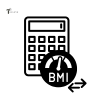Gastric Sleeve Calculator
Estimate your weight loss journey after vertical sleeve gastrectomy
BMI Requirements for Gastric Sleeve Surgery
- BMI ≥ 40: Automatically qualifies (Class III Obesity)
- BMI 35-39.9: Qualifies with 1+ obesity-related condition:
- Type 2 diabetes
- High blood pressure
- Sleep apnea
- Severe joint disease
- Heart disease
- BMI 30-34.9: May qualify with severe, uncontrolled diabetes (varies by country)
- Asian Patients: Typically 2.5 BMI points lower thresholds due to higher health risks
RELATED TOOLS The Ultimate Guide to Gastric Sleeve Weight Loss Calculators
If you’re considering gastric sleeve surgery, one of your biggest questions is likely: “How much weight will I lose?” A gastric sleeve calculator can help estimate your potential weight loss and set realistic expectations. This comprehensive guide explains how these calculators work, what factors affect results, and how to use them effectively.
What Is a Gastric Sleeve Calculator?
A gastric sleeve weight loss calculator is a tool that estimates how much weight you may lose after vertical sleeve gastrectomy (VSG) surgery. These calculators use key metrics like:
Current weight & height (to determine BMI)
Age & gender (metabolism varies by demographic)
Activity level (more movement = better results)
Starting body fat percentage (if available)
Most calculators provide:


How Much Weight Will I Lose with Gastric Sleeve Calculator: A Month-by-Month Breakdown
One of the most common questions patients ask is “How much weight will I lose with gastric sleeve calculator estimates?” While individual results vary, most patients follow a predictable weight loss pattern. Here’s what you can typically expect from your gastric sleeve weight loss calculator projections:
First Month (Immediate Post-Op Period)
5-15% of excess weight lost
Rapid water weight and glycogen depletion
Strict liquid diet helps reset eating habits
Calculator projections often most accurate during this phase
Months 2-3 (Rapid Weight Loss Phase)
15-25% of excess weight lost
Pureed/soft foods reintroduced
Energy levels begin improving
Most BMI calculator for gastric sleeve tools show steepest decline here
Months 4-6 (Steady Reduction Phase)
30-40% of excess weight lost
Transition to solid foods begins
Weight loss remains consistent but slows slightly
Your weight loss calculator gastric sleeve may adjust projections now
Months 7-12 (Stabilization Phase)
50-70% of excess weight lost
Body adapts to new stomach size
Focus shifts to muscle retention
Final calculator estimates become clearer
12+ Months (Long-Term Maintenance)
60-80% of excess weight lost (top performers)
Weight stabilizes at new set point
About 10-15% of patients regain some weight
Calculators less useful – real habits determine success
Key factors affecting your gastric sleeve calculator accuracy during this timeline:
Strict adherence to post-op diet protocols
Consistent protein intake (60-80g daily)
Regular exercise routine implementation
Proper hydration and vitamin supplementation
Remember: While a how much weight will I lose with gastric sleeve calculator provides helpful estimates, your personal commitment to lifestyle changes ultimately determines your success. The most accurate projections come from:
Using multiple reputable calculators
Consulting with your bariatric team
Tracking your actual results vs. projections
Adjusting habits based on progress
ALSO CHECK How Accurate Are Gastric Sleeve Calculators?
While a weight loss calculator gastric sleeve provides estimates, individual results vary based on:




Most patients lose 60-70% of excess weight in the first year.
How to Use a Gastric Sleeve Calculator
To get the most accurate estimate:
Enter your current weight and height – This calculates your BMI.
Select your age and gender – Metabolic rates differ by age/sex.
Input activity level – Sedentary vs. active impacts calorie burn.
Review the projections – Most tools show monthly estimates.
Example:
Starting weight: 250 lbs
Height: 5’6″
Age: 35
Activity level: Moderately active
Estimated 12-month loss: ~90-110 lbs
What Factors Influence Weight Loss After Gastric Sleeve?
1. Pre-Surgery BMI
Higher BMI patients often lose more weight initially.
A BMI calculator for gastric sleeve helps categorize obesity levels.
2. Dietary Habits
Protein-focused diets maximize fat loss.
Sugary foods slow progress.
3. Exercise Routine
Walking, strength training, and cardio improve results.
Inactive patients lose weight slower.
4. Hormonal Changes
Ghrelin (hunger hormone) drops after surgery.
Insulin sensitivity improves, aiding fat loss.
5. Follow-Up Care
- Regular check-ins with your surgeon optimize outcomes.
- Nutritional deficiencies must be monitored.
Who Should Use a Gastric Sleeve Calculator?
A how much weight will I lose with gastric sleeve calculator is helpful for:




Limitations of Gastric Sleeve Calculators
While useful, these tools cannot account for:


For the most accurate assessment, consult a bariatric surgeon.
Tips to Maximize Weight Loss After Gastric Sleeve
1. Follow the Post-Op Diet Strictly
Phase 1 (Weeks 1-2): Clear liquids
Phase 2 (Weeks 3-4): Full liquids & protein shakes
Phase 3 (Weeks 5-6): Soft/pureed foods
Phase 4 (Week 7+): Solid foods (small portions)
2. Prioritize Protein
Aim for 60-80g daily to prevent muscle loss.
Eggs, lean meats, and protein shakes help.
3. Stay Hydrated
Sip 64+ oz of water daily (no sugary drinks).
Avoid drinking 30 min before/after meals.
4. Exercise Regularly
Start with walking, then add strength training.
Goal: 150+ minutes of activity per week.
5. Monitor Vitamins & Minerals
Take prescribed supplements (B12, iron, calcium).
Blood tests help detect deficiencies early.
When to See a Doctor
Contact your bariatric team if:


Final Thoughts
A gastric sleeve calculator provides a helpful estimate, but real-world results depend on your commitment to diet, exercise, and medical follow-ups. Use a BMI calculator for gastric sleeve to assess candidacy, track progress with a weight loss calculator gastric sleeve, and stay disciplined for the best outcome.
For personalized projections, consult a bariatric specialist who can factor in your unique health profile.








